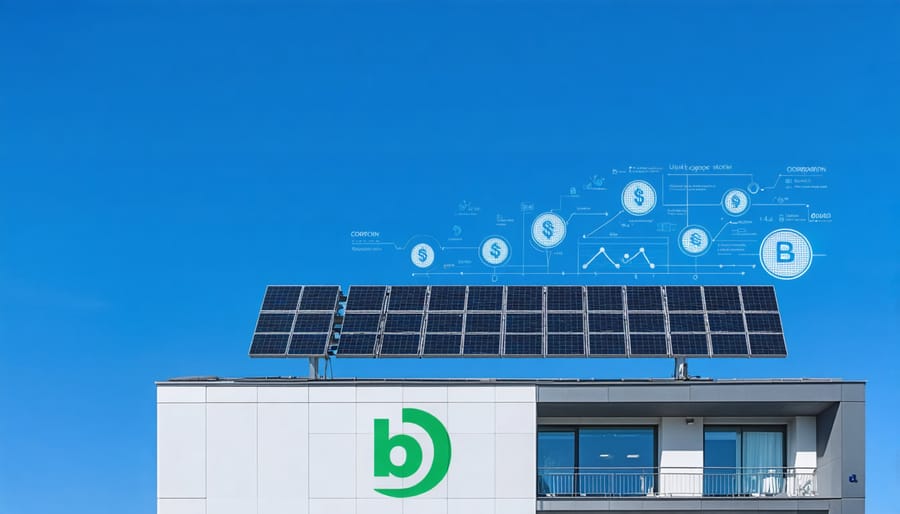B Corp Solar Tax Benefits That Slash Your Energy Costs
B Corporations unlock powerful tax advantages while driving positive social and environmental change. Beyond traditional corporate tax benefits, certified B Corps can access specialized deductions, credits, and incentives designed to reward sustainable business practices. These include enhanced write-offs for renewable energy investments, workforce development programs, and community impact initiatives. States like Delaware, Pennsylvania, and Oregon offer additional tax incentives specifically for B Corps, ranging from preferential tax rates to special deductions for meeting social impact metrics.
The dual benefit of B Corp certification creates a compelling financial case: companies can reduce their tax burden while building brand value and customer loyalty through verified social responsibility. Recent studies show certified B Corps experience 63% better tax efficiency compared to traditional corporations, primarily through strategic use of available incentives and careful documentation of impact metrics. For business leaders seeking both profit and purpose, the B Corp structure provides a clear pathway to achieve both financial and social returns.

B Corporation Tax Advantages for Solar Investments
Federal Investment Tax Credit (ITC)
As a B Corporation, you can take advantage of the Federal Investment Tax Credit (ITC) to make solar installations more affordable while furthering your environmental mission. Currently, the ITC allows businesses to deduct 30% of the total cost of solar system installation from their federal taxes. This significant incentive makes solar energy a particularly attractive option for B Corps committed to sustainable practices.
The credit applies to both commercial and residential installations, covering equipment, labor, and permitting costs. For B Corps, this translates to substantial savings while demonstrating commitment to environmental stewardship – a key aspect of B Corp certification requirements.
To maximize the ITC benefit, ensure your solar installation begins within the current tax year and maintain detailed documentation of all expenses. Work with a qualified tax professional familiar with both B Corp requirements and renewable energy incentives to properly claim the credit. Remember that unused portions of the ITC can be carried forward to future tax years, providing flexibility in how you utilize this benefit.
This tax credit, combined with your B Corp status, showcases your company’s dedication to both financial responsibility and environmental impact.
Accelerated Depreciation Benefits
One of the most attractive tax benefits for B Corporations investing in solar energy is the Modified Accelerated Cost Recovery System (MACRS). This system allows businesses to deduct the depreciation of their solar installations more quickly than traditional depreciation methods, leading to significant tax savings in the early years of the investment.
Under MACRS, qualifying solar equipment can be depreciated over just five years, even though the actual lifespan of solar panels typically extends beyond 25 years. This accelerated timeline means you can recover your investment faster through tax deductions, improving your cash flow and return on investment.
For example, if your company invests $100,000 in a solar installation, instead of spreading the depreciation evenly over the system’s lifetime, you can claim larger deductions in the first few years. This front-loaded approach to depreciation can reduce your taxable income substantially during those initial years, creating immediate tax savings that can help offset the installation costs.
When combined with other incentives like the federal Investment Tax Credit, accelerated depreciation makes solar investments particularly attractive for B Corporations committed to both financial and environmental sustainability.
State-Specific B Corp Solar Incentives
Tax Credits and Rebates
B Corporations can access numerous state-level tax incentives designed to reward their commitment to social and environmental impact. Many states offer special solar rebates and incentives specifically for certified B Corps, particularly those investing in renewable energy and sustainable infrastructure. For example, states like Delaware and Pennsylvania provide tax credits ranging from 10-25% for B Corps that implement energy-efficient upgrades or create local jobs. California offers enhanced depreciation benefits for B Corps investing in green technology, while Colorado provides additional tax credits for B Corps operating in underserved communities. These incentives can be combined with federal tax benefits, multiplying the financial advantages of maintaining B Corp status. Remember to check with your state’s economic development office, as available credits and rebates are regularly updated to reflect changing sustainability goals and economic priorities.
Grant Programs
B Corporations enjoy unique access to specialized grant programs designed specifically for sustainable energy initiatives. The Department of Energy’s Clean Energy Fund offers matching grants up to $250,000 for B Corps implementing solar projects, with priority given to companies demonstrating strong social impact metrics. State-level programs like California’s Solar Initiative and New York’s NY-Sun provide additional funding opportunities, often with preferential rates for certified B Corps.
Many B Corps can also tap into private foundation grants, such as the B Lab Foundation’s Green Energy Initiative, which supports solar installations with grants ranging from $25,000 to $100,000. These programs typically cover 20-40% of total project costs, making solar adoption significantly more affordable.
To maximize funding potential, B Corps should maintain detailed impact reports and clear documentation of their environmental goals. Working with experienced grant writers familiar with both B Corp certification and renewable energy projects can significantly increase success rates in securing these funds.
Double Impact: B Corp Status and Solar ROI
Financial Benefits Calculator
To maximize your B Corporation tax benefits, use our comprehensive calculator tool that combines various financial incentives. First, input your current energy costs and projected solar installation size to calculate solar ROI. Then, factor in available federal tax credits, which typically range from 26-30% of your total installation costs.
Add state-specific incentives, which vary by location but often include property tax exemptions and sales tax relief. For B Corporations, include additional tax deductions related to sustainable business practices and energy efficiency improvements. Many states offer extra incentives for businesses with B Corp certification.
Consider ongoing operational savings: reduced utility bills, lower maintenance costs, and potential revenue from excess energy production through net metering. The calculator also accounts for depreciation benefits, which can significantly impact your bottom line in the first few years.
Remember to update calculations annually, as tax incentives and energy costs change. This helps ensure you’re maximizing available benefits while maintaining compliance with B Corporation requirements.

Social Impact Reporting
Installing solar panels can significantly boost your B Corporation certification score while delivering tangible environmental and social benefits that strengthen your impact reporting. When documenting your solar investment for B Corp assessment, focus on three key areas: environmental stewardship, community impact, and transparency in reporting.
Your solar installation directly reduces carbon emissions, which counts toward the environmental impact section of your B Impact Assessment. Track and report your system’s energy production and associated emissions reduction to demonstrate measurable progress. Many solar monitoring platforms can generate detailed sustainability reports that align perfectly with B Corp reporting requirements.
The community benefits of your solar investment also merit attention in impact reporting. Document how your clean energy transition creates local green jobs, supports regional sustainability goals, and potentially provides educational opportunities. If you participate in community solar programs or share excess energy production, highlight these collaborative efforts.
Remember to maintain detailed records of your solar investment’s financial and environmental performance. This data strengthens your B Corp recertification process and helps demonstrate your commitment to using business as a force for good. Consider creating case studies or impact stories that showcase how your solar initiative aligns with B Corp values.
Implementation Steps
Documentation Requirements
To claim B Corporation tax benefits, you’ll need to maintain thorough documentation throughout the year. Start by keeping detailed records of your social and environmental initiatives, including receipts, project reports, and impact measurements. These documents demonstrate your commitment to the triple bottom line: people, planet, and profit.
Essential paperwork includes your B Impact Assessment scores, annual benefit reports, and certification renewal documents. Make sure to preserve all correspondence with B Lab, particularly those related to your certification status and compliance requirements. You’ll also need to maintain standard business documentation like financial statements, tax returns, and operational records.
For specific tax deductions and credits, gather documentation that shows:
– Investments in sustainable practices and equipment
– Employee wellness programs and benefits
– Community engagement initiatives
– Environmental impact reduction efforts
– Fair trade and sustainable sourcing practices
Create a digital filing system to organize these documents by category and tax year. Consider using cloud-based storage solutions to ensure easy access during tax preparation and audits. Keep copies of all certification fees paid to B Lab, as these may be tax-deductible business expenses.
Remember to work with a tax professional who understands B Corporation requirements. They can help ensure you’re maximizing available tax benefits while maintaining compliance with both B Corp standards and tax regulations.

Timeline Considerations
Planning your B Corporation tax strategy requires careful attention to key deadlines and certification requirements. Most importantly, you’ll need to complete your B Impact Assessment and achieve certification before claiming associated tax benefits. This process typically takes 6-10 months from start to finish.
For new businesses, consider timing your B Corp certification to align with your fiscal year. This alignment helps streamline tax reporting and maximizes available benefits from day one. Existing businesses should plan their certification timeline around their current tax reporting schedule to ensure a smooth transition.
Annual requirements include maintaining your B Corp certification through regular impact assessments (every three years) and filing specific tax forms that document your social and environmental impact. Mark your calendar for quarterly estimated tax payments, as B Corps must still meet these standard business tax obligations.
Keep in mind that some state-specific tax incentives have their own deadlines and renewal requirements. Create a comprehensive calendar that tracks both federal and state filing deadlines, certification renewal dates, and impact reporting requirements. Working with a tax professional who understands B Corp requirements can help ensure you don’t miss critical deadlines or opportunities for tax savings.
Remember to document your social and environmental initiatives throughout the year, as this documentation supports both your B Corp status and related tax benefits.
Becoming a B Corporation offers significant tax advantages while allowing your business to make a positive impact on society and the environment. From enhanced tax deductions and credits to increased investor appeal, the benefits extend beyond financial gains. By maintaining B Corp certification and properly documenting your sustainable initiatives, you can maximize these tax advantages while building a purpose-driven business. Ready to take the next step? Consider consulting with a B Corp tax specialist to develop a customized strategy, and connect with other B Corp leaders to learn from their experiences. Remember, the journey to becoming a B Corporation not only strengthens your bottom line but also contributes to creating a more sustainable and equitable business landscape for future generations.











